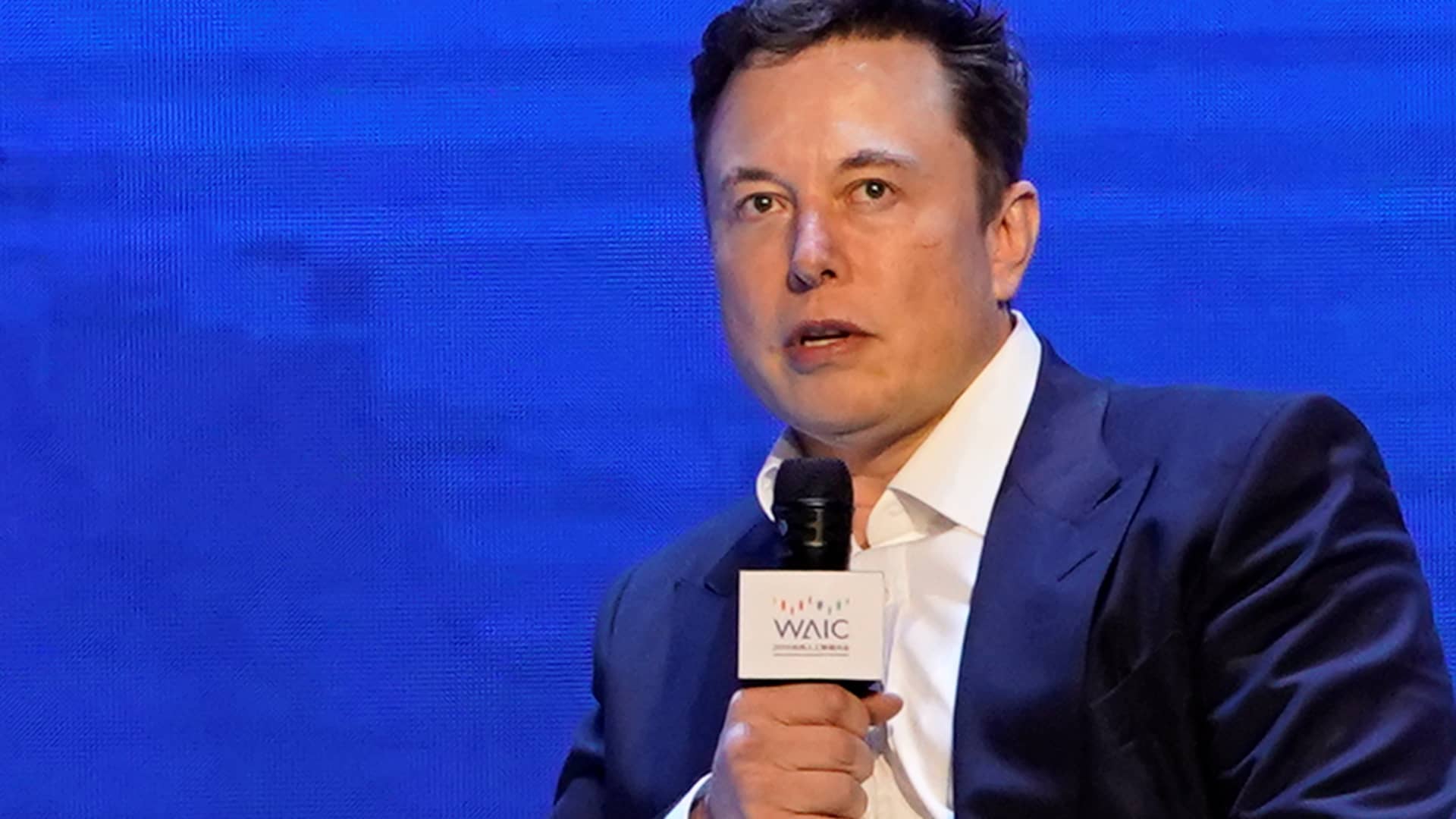
Tesla Inc CEO Elon Musk attends the World Artificial Intelligence Conference (WAIC) in Shanghai, China August 29, 2019.
Aly Song | Reuters
Elon Musk said in court Wednesday that he does not want to be the CEO of any company.
He recently acquired social media giant Twitter and appointed himself as the CEO, adding to his responsibilities as the CEO and “technoking” of electric vehicle maker Tesla, and CEO and CTO of the U.S. defense contractor SpaceX.
Musk also confirmed that the arrangement at Twitter is temporary. “I expect to reduce my time at Twitter and find somebody else to run Twitter over time,” he said.
Musk and Tesla are in the midst of a trial in Delaware over the 2018 CEO pay package the company granted him, an unparalleled compensation plan that has made Musk a centi-billionaire and the richest person on the planet.
Shareholder Richard J. Tornetta has sued Musk and Tesla alleging that the CEO compensation was excessive and that its authorization by the Tesla board amounted to a breach of its fiduciary duty.
Musk explained during the testimony that CEO is not necessarily an apt description for the work he says he does at his companies.
“At SpaceX it’s really that I’m responsible for the engineering of the rockets and Tesla for the technology in the car that makes it successful,” Musk said. “So, CEO is often viewed as somewhat of a business-focused role but in reality, my role is much more that of an engineer developing technology and making sure that we develop breakthrough technologies and that we have a team of incredible engineers who can achieve those goals.”
He also said, “It’s my experience that great engineers will only work for a great engineer. That is my first duty, not that of CEO.”
Attorneys for Tornetta asked Musk about a CNBC report that he had authorized at least 50 Tesla employees, mostly Autopilot engineers, to help with his work at Twitter, now that he owns the social media company.
Musk said he only called on Tesla employees to assist him at Twitter on a “voluntary basis” and to work “after hours” at Twitter. He said that no Tesla board member had called him to say it is not a good idea to use Tesla resources for one of his other, privately held companies.
“This was an after hours — just if you’re interested in evaluating, helping me evaluate Twitter engineering … that’d be nice. I think it lasted for a few days and it was over.”
When a lawyer asked if he thought it was a good idea to be using Tesla assets at Twitter, Musk responded, “I didn’t think of this as using Tesla assets.” He added, “There’s 120,000 people at the company. This is de minimis.”
With all his business commitments, Tesla has taken more of his time than anything in recent years, Musk said during the testimony.
Attorneys for the plaintiffs asked whether it was a good idea for Musk to strike a combative attitude towards regulators and specifically asked him about prior insults he lobbed at the Securities and Exchange Commission.
“In general, I think the mission of the SEC is good but the question is whether that mission is being executed well,” he replied.
“In some cases I think it is not. The SEC fails to investigate things that they should and places far too much attention on things that are not relevant. The recent FTX thing I think is an example of that. Why was there no attention given to FTX? Investors lost billions. Yet the SEC continues to hound me despite shareholders being greatly rewarded. This makes no sense.”
In fact, the SEC and several other regulators have reportedly launched investigations into collapsed crypto firm FTX, but it’s not clear if those investigations started prior to the firm’s sudden bankruptcy last week.
What ‘SEC’ stands for
The SEC had charged Tesla and Musk for making “false and misleading” statements to shareholders when Musk said in tweets on Aug. 7, 2018, that he was thinking of taking the automaker private at $420 a share and had “funding secured.”
The price of Tesla shares jumped by over 6% after Musk’s tweets, and trading was halted the same day. Tesla shares remained volatile for weeks after the incident.
As part of a settlement agreement, Tesla and Musk agreed to pay a $20 million fine, Musk had to give up his role as chairman at Tesla for three years and agreed not to claim innocence or deny the SEC’s allegations. Musk and Tesla also committed to have the CEO’s tweets vetted by a securities lawyer before posting them if they contained material business information that could effect Tesla’s share price.
Tornetta’s lawyers asked Musk if he had a securities lawyer review all his tweets about Tesla and why he had been claiming innocence including in press interviews. Musk seemed to acknowledge that he doesn’t run all of his Tesla-related tweets by a lawyer first.
And he said, “The consent decree was made under duress. An agreement made under duress is not valid, as a foundation of law.”
At a time when Tesla shares were on a massive upswing, Musk had written in a tweet on July 2, 2020: “SEC, three letter acronym, middle word is Elon’s.” The message was widely read as having a vulgar meaning and comprising a major insult to the agency.
On Wednesday in the Delaware court, attorneys asked him about this tweet and Musk claimed it had been widely misunderstood. The Tesla CEO said in court that he meant the initials to stand for “Save Elon’s Company” but the tweet was “interpreted differently.”





